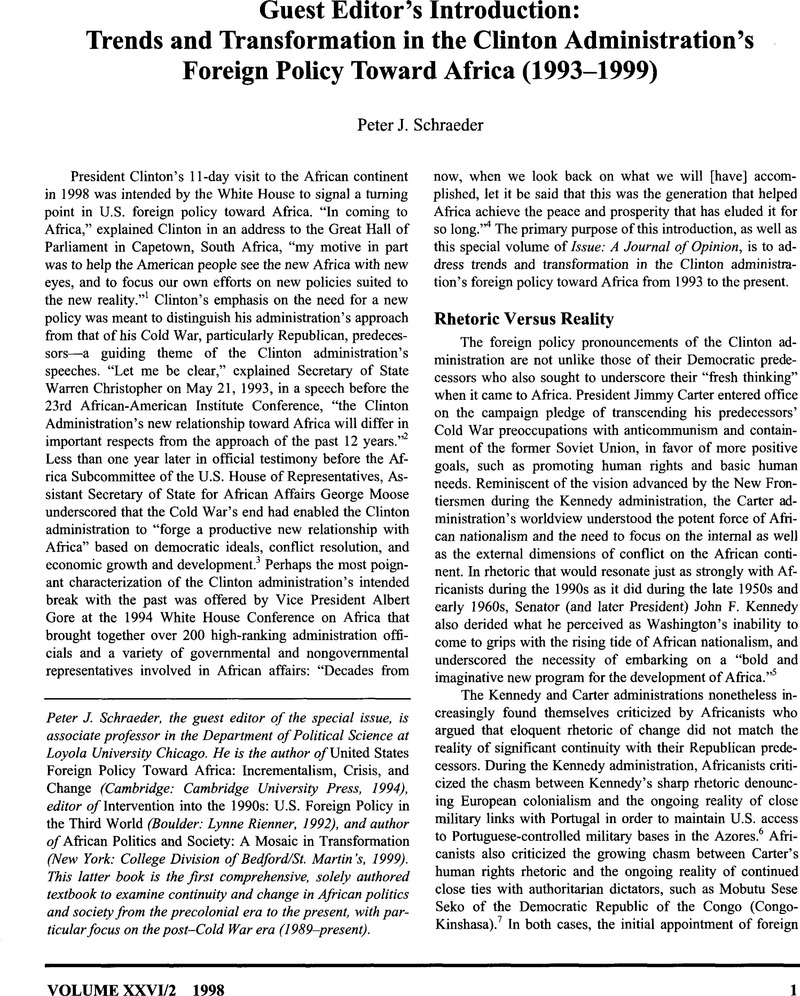Published online by Cambridge University Press: 13 August 2021

1. Press statement of March 26, 1998, provided by the White House.
2. Warren Christopher, “The United States and Africa: A New Relationship,” Speech delivered at the 23rd African American Institute Conference, Reston, Virginia, May 21, 1993, p. 7 (transcript provided by U.S. Department of State, Office of the Spokesperson).
3. George Moose, “U.S. Policy in Sub-Saharan Africa,” Testimony before the Africa Subcommittee of the U.S. House of Representatives, March 2, 1994, p. 1 (transcript provided by the U.S. Department of State, Bureau of African Affairs).
4. Al Gore, “America’s Vision for Africa,” in White House Conference on Africa, 1994, p. 22. Document provided by the White House.
5. Kennedy, John F., “The New Nations of Africa,” in “Let the Word Go Forth”: The Speeches, Statements, and Writings of John F. Kennedy, ed. Sorensen, Theodore C. (New York: Delacorte Press, 1988), 365, 368Google Scholar.
6. See Marcum, John, “The Politics of Indifference: Portugal and Africa, a Case Study in American Foreign Policy.” Issue: A Journal of Opinion 2, no. 3 (Fall 1972): 9–17 CrossRefGoogle Scholar.
7. See Schraeder, Peter J., United States Foreign Policy Toward Africa: Incrementalism, Crisis, and Change (Cambridge: Cambridge University Press, 1994), esp. 87–98.CrossRefGoogle Scholar
8. Thomas L. Friedman, “Foreign Policy Cooks on Back Burner,” New York Times, February 8, 1993, A7.
9. Ibid.
10. See Jim Cason and Bill Martin, “Clinton and Africa: Searching for a Post–Cold War Order,” Bulletin: Association of Concerned Africa Scholars nos. 38–39 (Winter 1993): 3.
11. Lake, Anthony, “Caution and Concern: The Making of American Policy Toward South Africa, 1946-1971,” Ph.D. diss., Princeton University, 1974. Subsequently published as The “Tar Baby “ Option: American Policy Toward Southern Rhodesia (New York: Columbia University Press, 1976)Google Scholar.
12. Schraeder, Peter J., “It’s the Third World Stupid!’: Why the Third World Should Be the Priority of the Clinton Administration,” Third World Quarterly 14, no. 2 (1993): 215–237 CrossRefGoogle Scholar.
13. Steven Greenhouse, “Administration Faulted on Africa Conference,” New York Times, June 27,1994, A5.
14. Elaine Sciolino, “New U.S. Peacekeeping Policy De-emphasizes Role of the UN,” New York Times, May 5, 1994, Al, A4.
15. Cason and Martin, “Clinton and Africa,” p. 2.
16. See, e.g., Ken Menkhaus and Terrence Lyons, “What Are the Lessons to Be Learned From Somalia?” CSIS Africa Notes, no. 144 (January 1993).
17. Cason and Martin, “Clinton and Africa,” p. 3.
18. See Lake, Anthony, “From Containment to Enlargement,” Address delivered at the School of Advanced International Studies, Johns Hopkins University, Washington, D.C., September 21, 1993.Google Scholar
19. See Schatzberg, Michael G., Mobutu or Chaos? The United States and Zaire, 1960–1990 (Lanham, Md.: University Press of America, 1991)Google Scholar.
20. Schraeder, United States Foreign Policy Toward Africa, p. 107.
21. Confidential interview.
22. Glaser, Antoine and Smith, Stephen, L’Afrique Sans Africains: Le Rêve Blanc du Continent Noir (Paris: Editions Stock, 1994)CrossRefGoogle Scholar.
23. Personal interview with Weaver, Michael A., July 19, 1996, Gaborone, , Botswana, . See also Business International Limited, “The Agency for International Development Presents Critical Issues for American Investors in Botswana” (London: Business International Limited, February 1991)Google Scholar.